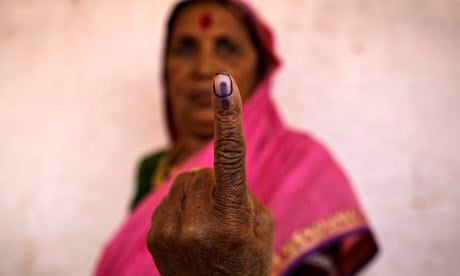Saket Mani, children and youth representative, United Nations, Pune, India.
Make inequality a political campaign issue: Despite being important to the electorate, inequality is absent from major political campaigns. Inequality clearly matters in Asia. A recent poll found that 82% of Indians see it as a major problem. It doesn't take an economist or a sociologist to know that such sharp inequalities are unsustainable. But curiously, in the loud political discourse that assaults us non-stop in the run-up to the general elections, none of the major parties has made fighting inequality a real issue in their campaigns.
Jayati Ghosh, professor of economics, Jawaharlal Nehru University, New Delhi, India.
Introduce land reforms and raise taxation for the wealthy: We should work towards reducing asset inequality through redistributive land reforms but also through inheritance taxes, preventing monopoly of control over water, forests and mineral resources and reducing financial concentration. The equality of opportunity needs to be increased through good quality and universal public provision of essential amenities and social services. We can raise the public resources for doing all this by taxing the wealthy more and by increasing the effective taxation of corporations, which have benefited greatly from the boom and more than doubled their share of national income, but not been taxed accordingly.
Give a voice to oppressed groups: We can tackle bias against caste and gender first of all by recognising the value and dignity of all work (including unpaid work) and all workers (including those in the most difficult arduous and degraded occupations). We should also provide a greater voice to traditionally oppressed and suppressed groups, including by enabling unions and association, and making public and corporate private activity more transparent and accountable to the people generally.
Improve the balance of mass media: The media in India plays a role in sustaining inequality. This is becoming an urgent problem. We must take measures to reduce corporate takeover and manipulation of mass media.
Rikke Nöhrlind, executive director, International Dalit Solidarity Network (IDSN), Copenhagen, Denmark. @idsnupdates
Eliminate caste discrimination: Caste discrimination is still all pervasive. Discrimination based on caste status is a root cause of the high poverty levels that caste-affected people experience. Most Dalits, live below the poverty line, earn less than the minimum wage, have no access to education, experience segregation in access to housing and suffer from numerous diseases, not least because of lack of access to safe drinking water and sanitation. This inequality is exacerbated by the lack of implementation of existing laws to protect the Dalits.
Arun Kumar, state team leader, Futures Group International, Bhubaneswar, India.
Harness the power of technology: Policymakers should not forget that technology has helped in reducing some of the access barriers in India, particularly in relation to access to information. Policymakers should focus on making technology cheaper and deepening its penetration.
Avinash Kumar, director of policy, research and campaigns, Oxfam India, New Delhi, India. @Avinashkoomar
Widen access to quality basic services: A two-tier system has been created, with largely privatised quality education and health care for those who can pay, and a large population left to fend for themselves with very poor quality public services.
Make women more visible in public life and institutions: It is shocking to see that in India women make up only 5% of the total police force, just two out of 24 supreme court judges and as we are going through polls right now, only 11% of the last parliament are women.
Akhil Paul, director, Sense International India, Ahmedabad, India. @SenseInternatl
Ensure that India's growth is for the benefit of the many, not the few: India is a place of increasingly stark extremes in wealth. In the same India where millions use smartphones, millions live in poverty. Within India, there are many different countries. One is high-flying and tech-savvy, with people driving flashy cars in and out of top-starred hotels and clubs. Another is white-collared middle class, and another is still struggling to survive.
Make development inclusive of those with disabilities: As far as India is concerned, we might score very highly in terms of growth of physical infrastructure, but most of the public places are inaccessible to people with disabilities. As per the 2011 census, India has about 2.7 million people with disabilities, and only a handful of those enjoy education and/or employment.
Asha Kowtal, general secretary, All India Dalit Women Rights Forum (Aidmam), New Delhi, India. @ashazech
Challenge the growth agenda: Beware of phrases like 'inclusive growth' and 'growth with a human face'. These concepts are not helpful and basically serve the purpose of hiding the structural violence and poverty in India.
Ensure that all groups and communities can express their voice without fear: While they may have the vote, Dalits in the past experienced election violence. In the last election the National Dalit Election Watch (NDEW) recorded 263 incidents of election violence against Dalits, formally known as untouchables, in India. The violence manifests in several forms with Dalits being threatened, abused and prevented from voting and also violently attacked after the polls.
Niheer Dasandi,research fellow, developmental leadership programme at University College London, UK. @NiheerDasandi
Stop the blame game: Instead of addressing the actual causes of inequality, we indulge in a blame game. Both the middle classes and political leaders have a tendency to blame the poor for their poverty, rather than to consider broader structural issues. When visiting Anand in Gujarat last year, Narendra Modi blamed the huge problem of child malnutrition in the state on the parents of the children. There is a very strong tendency among the middle class to treat poverty and inequality as natural and inevitable.
Read the rest of the advice shared on the live Q&A here.
Join the community of global development professionals and experts. Become a GDPN member to get more stories like this direct to your inbox

Comments (…)
Sign in or create your Guardian account to join the discussion